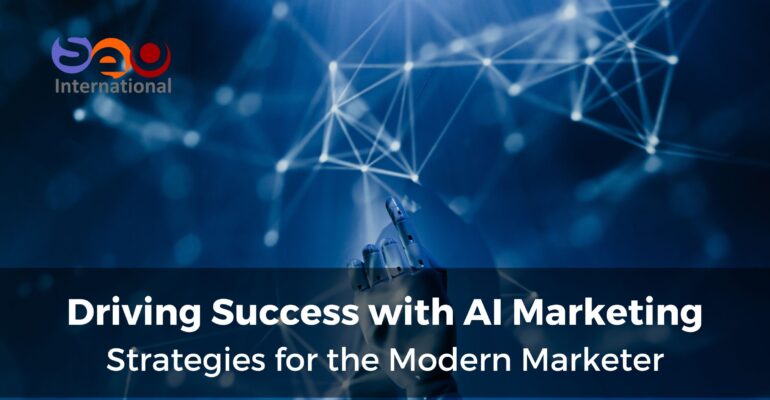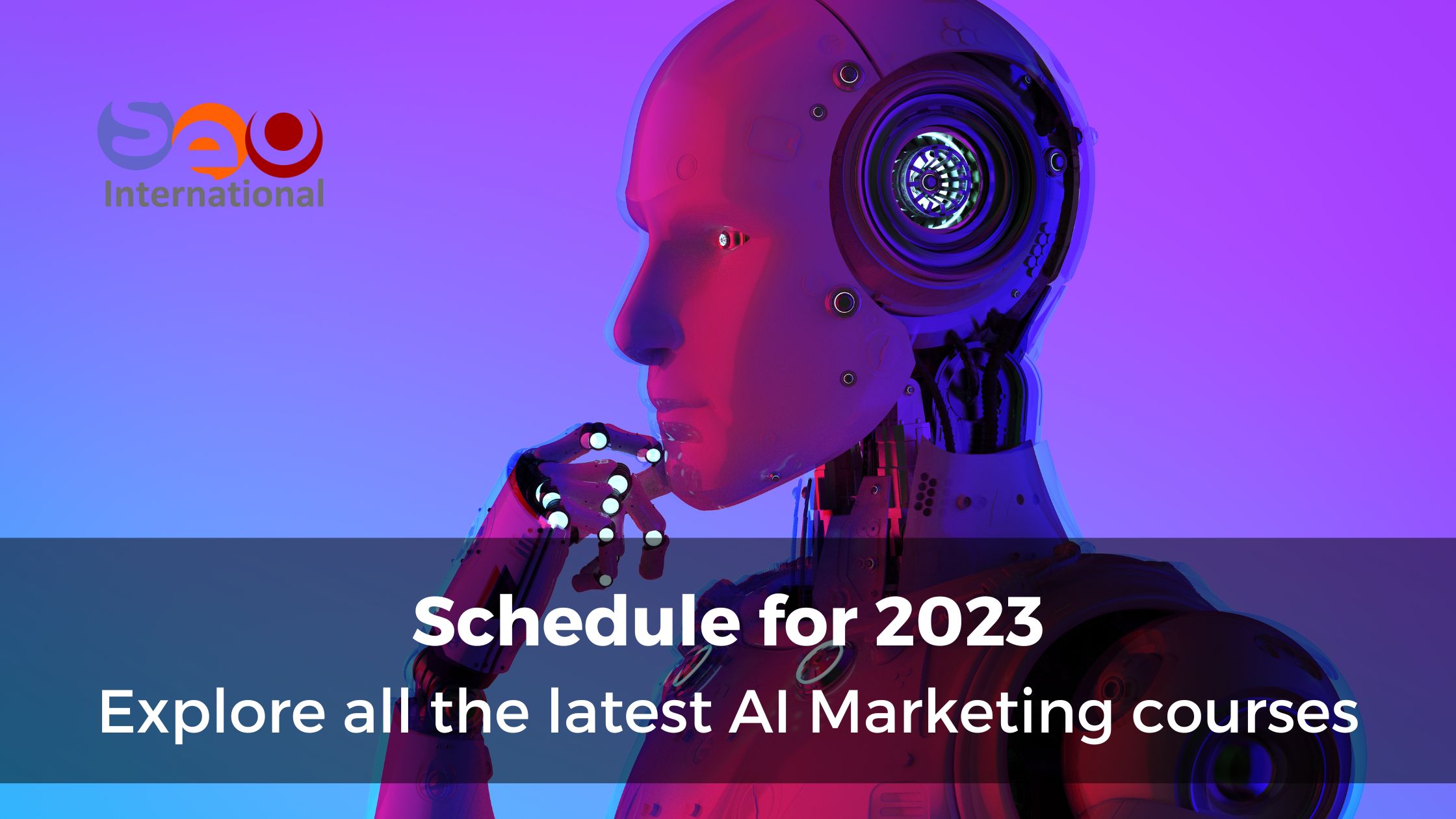Driving Success with AI Marketing: Strategies for the Modern Marketer
May 7, 2023 2023-05-07 21:01Driving Success with AI Marketing: Strategies for the Modern Marketer
The marketing landscape has seen a continuous evolution, with businesses adapting to new technologies and trends. One such revolution is the rise of artificial intelligence (AI) in marketing. The importance of adopting AI-driven marketing strategies cannot be overstated, as it has the potential to transform marketing efforts and help businesses stay competitive.
Understanding AI Marketing
AI marketing refers to the use of artificial intelligence technologies to improve marketing campaigns and strategies. By leveraging AI, businesses can analyze large datasets, automate tasks, and make data-driven decisions more efficiently than traditional marketing methods.
Get Started with Artificial Intelligence – Paul Roetzer, Founder & CEO, Marketing AI Institute
Revolutionizing Marketing with AI: The Future is Here | Neil Patel, Co-Founder, NP Digital
Key Components of AI Marketing
Machine Learning
Machine learning is a subset of AI that focuses on the development of algorithms that can learn from and make predictions based on data. In marketing, machine learning helps analyze consumer behavior patterns and predict their future actions, enabling businesses to create more targeted and personalized campaigns.
Natural Language Processing
Natural language processing (NLP) is another AI technique that enables machines to understand and interpret human language. NLP is particularly useful in marketing for sentiment analysis, chatbot development, and content generation.
Predictive Analytics
Predictive analytics combines AI, machine learning, and statistical modeling to forecast future events based on historical data. In marketing, predictive analytics can be used to identify potential customers, optimize marketing spend, and improve customer retention.
How AI Marketing Differs from Traditional Marketing Methods?
Traditional marketing methods often rely on manual efforts and intuition for decision-making, while AI marketing uses data-driven insights and automation to create more efficient and targeted marketing campaigns. This shift towards AI enables businesses to optimize their marketing efforts, resulting in improved ROI and more personalized customer experiences.
Benefits of AI Marketing Strategies
Enhanced Customer Segmentation and Targeting
AI helps businesses analyze large volumes of data to understand their customers better, enabling accurate customer segmentation and more effective targeting of marketing efforts. This results in more relevant and engaging marketing campaigns, leading to increased conversions and customer loyalty.
Improved Personalization and Relevance of Marketing Messages
AI-powered tools can analyze customer behavior and preferences, allowing businesses to create highly personalized and relevant marketing content that resonates with their target audience. This level of personalization enhances the customer experience and fosters long-term relationships.
Optimized Marketing Spend and Increased ROI
AI-driven marketing strategies enable businesses to allocate their marketing budgets more effectively, ensuring a higher return on investment (ROI). By utilizing AI to identify the most effective marketing channels and tactics, businesses can maximize their marketing spend and generate better results.
Real-Time Data Analysis and Decision-Making
AI allows for real-time analysis of customer data, enabling businesses to make informed decisions and quickly adapt to changing market trends. This agility helps businesses stay ahead of the competition and capitalize on new opportunities.
Streamlined Marketing Workflows and Reduced Manual Efforts
AI-powered tools can automate repetitive tasks, freeing up time for marketing teams to focus on more strategic initiatives. This increased efficiency leads to a more agile and effective marketing department, driving business growth.
AI Marketing Tools and Techniques
Customer Data Platforms (CDPs) and AI-Driven Insights
CDPs collect and analyze customer data from various sources, providing businesses with actionable insights to improve their marketing strategies. AI-driven insights derived from CDPs can help businesses better understand their customers and create more targeted marketing campaigns.
AI-Powered Chatbots and Conversational Marketing
Chatbots can handle customer inquiries and provide personalized recommendations, enhancing customer engagement and satisfaction. By utilizing AI-powered chatbots, businesses can improve their customer support and create more meaningful interactions with their audience.
Programmatic Advertising and AI-Optimized Ad Placements
Programmatic advertising uses AI-driven algorithms to automatically place ads in the most effective channels and target the right audience. This approach helps businesses optimize their ad budgets and improve the overall efficiency of their marketing efforts.
Content Creation and Curation Using AI
AI-powered tools can create and curate content based on customer preferences, ensuring that businesses deliver relevant content that resonates with their target audience. These tools can generate blog posts, social media updates, and even personalized emails, all tailored to the specific interests of individual users.
Sentiment Analysis and Social Listening Tools
AI can monitor social media platforms and other online channels to gather valuable customer feedback and sentiment. By analyzing this data, businesses can better understand their audience, identify trends, and make data-driven decisions to improve their marketing strategies.
Implementing AI Marketing Strategies
Identifying the Right AI Marketing Tools for Your Business
Understand your marketing goals and the unique needs of your target audience to choose the most suitable AI tools. Consider factors such as budget, ease of integration, and the level of customization required to ensure the chosen tools align with your overall marketing strategy.
Integrating AI Technologies into Your Existing Marketing Processes
Ensure a seamless transition by incorporating AI-powered tools within your current marketing workflow. Start with a pilot project to test the effectiveness of the AI tools, gather feedback, and make any necessary adjustments before fully integrating them into your marketing processes.
Training and Upskilling Your Marketing Team
Equip your marketing team with the necessary skills to leverage AI-powered tools effectively. This may involve providing training sessions, workshops, or access to online resources that help your team members understand and utilize AI technologies.
To learn more about AI in Digital Marketing, you may consider joining our upcoming courses at the Address Hotel, Dubai Marina or explore our other AI-related marketing courses:
Measuring the Success of AI-Driven Marketing Initiatives
Track key performance indicators (KPIs) and adjust strategies accordingly to optimize results. Metrics such as conversion rates, customer engagement, and ROI can provide valuable insights into the effectiveness of your AI-driven marketing initiatives.
Real-Life Business Examples of AI Marketing Success
Examples of Businesses That Have Successfully Implemented AI Marketing Strategies
- Netflix uses AI to recommend movies and TV shows to its users based on their viewing history and preferences. This has helped Netflix increase its subscriber base and engagement.
- Amazon uses AI to personalize its product recommendations for its customers. This has helped Amazon increase its sales and improve customer satisfaction.
- Walmart uses AI to optimize its pricing and inventory levels. This has helped Walmart reduce costs and increase sales.
- KLM uses AI to predict flight delays and cancellations. This has helped KLM improve its customer service and reduce its operational costs.
- Mastercard uses AI to detect fraud and prevent financial crimes. This has helped Mastercard protect its customers and reduce its losses.
- Coca-Cola uses AI to create personalized marketing campaigns for its customers. This has helped Coca-Cola increase its sales and brand awareness.
- Nike uses AI to design and develop new products that meet the needs of its customers. This has helped Nike stay ahead of the competition and increase its sales.
- Tesla uses AI to power its self-driving cars. This has helped Tesla revolutionize the automotive industry and become a leader in the electric car market.
- Spotify uses AI to create personalized playlists for its users. This has helped Spotify increase its user base and engagement.
- YouTube uses AI to recommend videos to its users. This has helped YouTube become the most popular video-sharing platform in the world.
- Facebook uses AI to personalize its news feed for its users. This has helped Facebook increase its user engagement and ad revenue.
- Twitter uses AI to detect and remove spam and abusive content. This has helped Twitter improve its user experience and make it a safer platform for everyone.
- LinkedIn uses AI to match job seekers with potential employers. This has helped LinkedIn become the world’s largest professional networking platform.
- Google uses AI to power its search engine, translate languages, and create personalized experiences for its users. This has helped Google become the most popular search engine in the world.
- IBM uses AI to develop new technologies, such as Watson, that can help businesses solve complex problems. This has helped IBM become a leader in the field of artificial intelligence.
These case studies can serve as an inspiration and provide valuable insights into the potential benefits of adopting AI marketing strategies.
Key Lessons Learned and Best Practices
From these examples of successful AI implementation in various industries, we can glean some valuable insights, strategies, and key lessons that can help other businesses succeed in their AI marketing endeavors:
- Identify and prioritize business objectives: Before implementing AI solutions, businesses should have a clear understanding of their goals and objectives, whether it’s improving customer satisfaction, increasing sales, or optimizing operations.
- Choose the right AI tools: Selecting AI tools and technologies that align with the business’s objectives and target audience is crucial. Research and evaluate different AI solutions to find the one that best fits your needs and budget.
- Integrate AI seamlessly into existing workflows: AI implementation should complement and enhance existing processes, not disrupt them. Begin with a pilot project to test the effectiveness of AI tools, gather feedback, and make any necessary adjustments before fully integrating them into the organization.
- Invest in employee training and upskilling: To fully leverage AI capabilities, businesses should invest in employee training and development. This ensures the team can effectively utilize AI tools and adapt to new technologies as they emerge.
- Monitor and optimize AI performance: Continuously track the performance of AI-driven marketing initiatives through key performance indicators (KPIs) and other relevant metrics. Use these insights to optimize strategies and make data-driven decisions for better results.
- Stay up-to-date with AI advancements: The field of AI is constantly evolving, with new technologies and applications emerging regularly. Stay informed of the latest developments and trends in AI to stay ahead of the competition and make the most of new opportunities.
- Emphasize data security and privacy: With AI implementation comes the responsibility to ensure data security and privacy. Implement robust security measures and adhere to data protection regulations to maintain customer trust and safeguard your business’s reputation.
By emphasizing the importance of selecting the right AI tools, properly integrating them into existing workflows, and continuously monitoring and optimizing their performance, businesses can harness the power of AI to achieve their marketing goals and maintain a competitive edge in the market.
The future of marketing lies in embracing AI technology. By implementing AI-driven marketing strategies, businesses can stay competitive, deliver personalized and relevant marketing messages, and optimize their marketing spend. As AI technologies continue to advance, businesses that adopt these strategies will be better positioned to drive growth and achieve long-term success.




